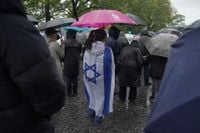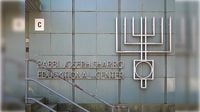As rain swept through the streets of Manchester’s Crumpsall neighborhood on October 3, 2025, hundreds of mourners gathered outside the Heaton Park Hebrew Congregation Synagogue. Their grief was palpable, their defiance unmistakable. Just a day earlier, the city’s Jewish community had been shaken to its core by a brutal car and stabbing attack that left two men dead, three others seriously injured, and a sense of safety shattered for many.
The events unfolded on Yom Kippur, the holiest day in the Jewish calendar, when worshippers had packed the synagogue for prayers and reflection. According to BBC and the Associated Press, 35-year-old Jihad Al-Shamie, a naturalized British citizen of Syrian descent, launched his assault by ramming his car into pedestrians before leaping out with a knife. Eyewitnesses described scenes of chaos and terror. “We thought we could see a car that had crashed, so we just thought it was a normal collision, but when we got a bit closer we saw a guy bleeding out on the floor,” recalled Gareth, a delivery driver, to BBC Radio Manchester. “And then there was a guy in front of the car, he was lying on the floor, and there were a few people standing in the road.”
As the attack unfolded, Al-Shamie attempted to force his way into the synagogue. “He was just stabbing the window, trying to get in [the building], and within seconds the police arrived,” Gareth continued. Officers issued warnings, but when Al-Shamie refused to comply, they opened fire. “He went down on the floor and then he started getting back up and then they shot him again,” Gareth said.
The violence was over in minutes, but not before tragedy struck. Two men lost their lives: Melvin Cravitz, 66, and Adrian Daulby, 53. In a heartbreaking twist, police later confirmed that Daulby was accidentally shot by an armed officer as he and other congregants desperately barricaded the synagogue doors to block the attacker. Three more men were hospitalized with serious injuries.
Inside the synagogue, panic gave way to swift action. Rabbi Daniel Walker, who was leading the service, remained calm and helped guide worshippers to safety. “They are true heroes,” one witness told the BBC. Police quickly evacuated the synagogue and secured the area, while a bomb disposal unit was dispatched to assess a suspicious device found on Al-Shamie. Thankfully, it proved not to be a viable explosive.
For those living nearby, the attack was deeply unsettling. “It was a little bit traumatising to be fair,” said Shah, a local resident who witnessed the car “driving straight for the members of the public.” Chava Lewin, who lives next door to the synagogue, described the chaos: “The second he got out of the car he started stabbing anyone near him. He went for the security guard and tried to break into the synagogue. He was in the courtyard. Someone barricaded the door. Everyone is in utter shock.”
Greater Manchester Police responded with urgency, locking down the area and detaining worshippers inside the synagogue until it was safe to evacuate. Six people in the Manchester area were arrested on suspicion of terrorism-related offenses as authorities sought to determine whether Al-Shamie acted alone. Four of those suspects—two men aged 30 and 32, and two women aged 46 and 61—remained in custody for further questioning, while two others were released without charge, according to the Associated Press.
Police disclosed that Al-Shamie was on bail for an alleged rape at the time of the attack, though he had not been charged. The assault was swiftly declared an act of terrorism, sparking a wider investigation into possible accomplices and motives.
In the aftermath, the shockwaves rippled far beyond the Jewish community. The attack intensified debate over the rise of antisemitic incidents in the United Kingdom, a trend that has accelerated since Hamas’s October 7, 2023, attack on Israel and the subsequent war in Gaza. The Community Security Trust, which provides protection for British Jews, reported a dramatic increase in antisemitic incidents—1,521 in the first half of 2025 alone, up from 965 over the same period the previous year.
Chief Rabbi Ephraim Mirvis, the head of Orthodox Judaism in Britain, voiced the anguish felt by many. “Right now, our hearts are shattered,” he said on Friday. “What transpired yesterday was an awful blow to us, something which actually we were fearing might happen because of the buildup to this action.” He called the attack the result of “an unrelenting wave of Jew hatred” both on the streets and online.
The political response was swift but not without controversy. Prime Minister Keir Starmer visited the synagogue, declaring the attack was designed to “inflict fear” on the Jewish community. However, Deputy Prime Minister David Lammy faced a hostile reception at Friday’s vigil, with some mourners shouting “not today” and “shame on you.” Many felt that politicians and leaders had failed to adequately reject anti-Jewish speech or protect Jews from hate crimes. “We feel that, as a community, we are not always listened to. We feel let down,” Simon Burton, a local resident, told the Associated Press.
Meanwhile, pro-Palestinian protests continued in Manchester and London, despite calls from police and politicians to postpone them out of respect for the grieving Jewish community. About 100 people gathered in Manchester in heavy rain, waving Palestinian flags and demanding an end to the war in Gaza. In London, larger demonstrations took place against the government’s decision to ban Palestine Action, a direct-action group now labeled a terrorist organization. Police made at least 493 arrests in London, adding to the more than 2,000 protest-related arrests since July.
These protests have been largely peaceful, but some Jewish community members say chants like “From the river to the sea, Palestine will be free” make them feel threatened. Others argue that the government’s crackdown on pro-Palestinian activism stifles free speech and legitimate criticism of Israel. As campaigner Jonathon Porritt told the BBC, “I don’t think that means that we should be asked to give up on our right to stand up for those who are being devastated by an ongoing, real-time genocide in Gaza.”
Despite the pain, moments of solidarity shone through. Neighbors of all faiths banded together, expressing mutual disgust at the violence. Sham Raja, a local businessman and British Muslim, said, “The Jewish community, obviously, they are very upset at what’s happened, and there’s no room for the antisemitic. And also as a British Muslim, I fully support the Jewish community and work with them shoulder to shoulder.”
As Manchester’s Jewish community mourns its losses and faces a future shadowed by insecurity, many remain determined not to let hatred define their lives. “We’re not going to cower away,” said Issaac Friedlander. “We’re not going to hide. ... We’re going to carry on with our lives.”
In the wake of tragedy, the city’s resilience and the refusal of its communities to be divided offer a glimmer of hope, even as the debate over antisemitism, protest, and security continues to roil the nation.


